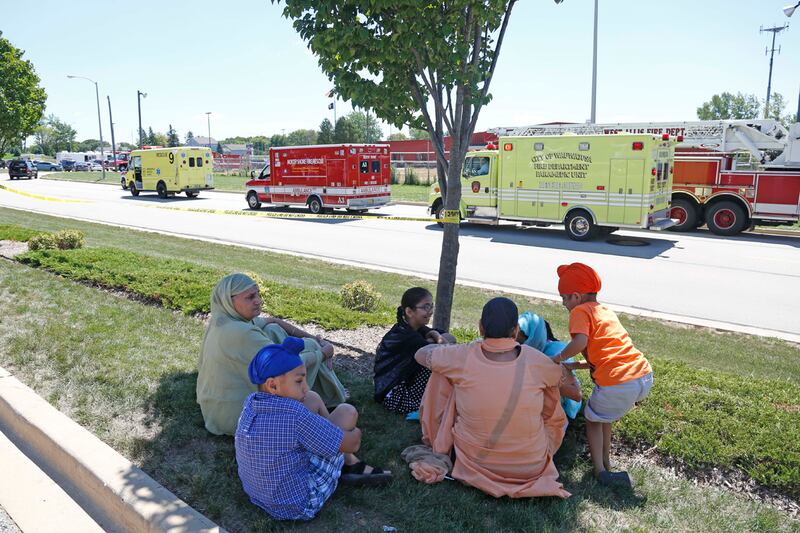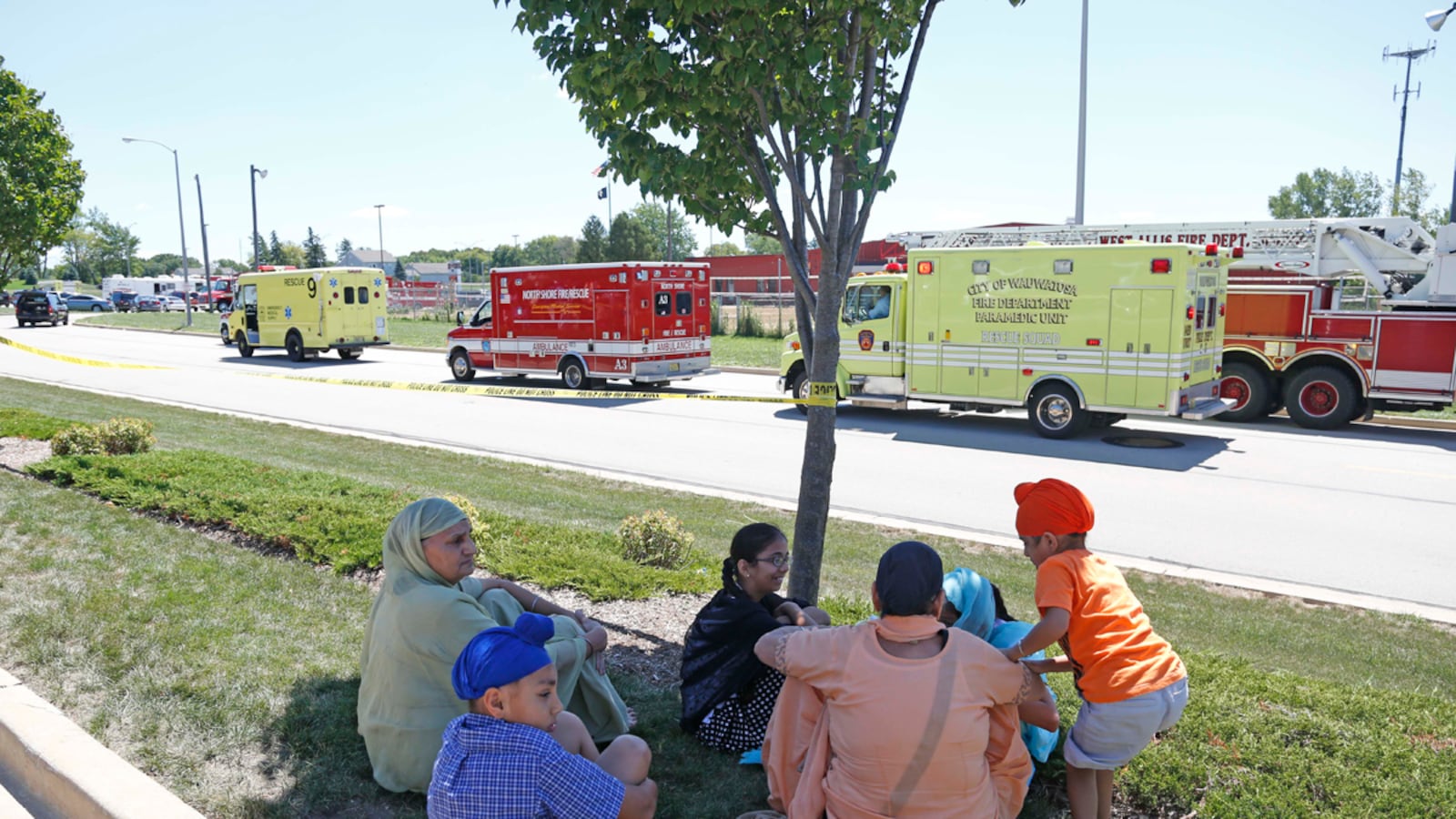The national Sikh community is banding together to denounce violence after an unidentified gunman, now presumed dead, opened fire at a temple in Oak Creek, Wisconsin, killing six people. Worshippers at the gurdwara—the name of a Sikh place of worship—had been preparing a meal in between traditional Sunday morning prayer sessions.

At a press conference outside the temple, Oak Creek Police Chief John Edwards said the shooting is being handled by the FBI as an act of “domestic terrorism.”
No evidence has emerged to indicate that the shooter targeted the temple because of the faith of the worshippers there, though the attack follows 11 years of violence and threats targeting the American Sikh community in the wake of September 11, 2011. Rajwant Singh, chairman of the Sikh Council on Religion and Education, a faith-based nonprofit, tells The Daily Beast that the community has been worried about hate crimes ever since. “In the back of our minds, there has always been an apprehension,” he said. “Any incident that occurs in the Middle East or any major loss of life of American troops in Iraq or Afghanistan has always created a fear that there would be some reaction. We didn’t know when or to what scale it would happen.”
Singh said those fears were realized this morning. “It is an immense tragedy.”
Prominent Sikh leaders believe the violence against the Sikh community that began after 9/11 stemmed largely from prejudice against Muslims; Sikhs were confused with Muslims because most Sikhs wear turbans. “Most Americans believe that anybody wearing a turban is a Muslim or is in the Taliban or is a bin Laden follower,” said Singh. “Ironically, 99 percent of the people who wear turbans are Sikhs.”
Witnesses say Sunday’s gunman immediately shot the temple’s priest, Satwant Singh “Sam” Khaleka, after entering the gurdwara. Typical Sunday prayers at an American Sikh temple begin at around 6:30 or 7 in the morning, and conclude between 9:30 and 10 a.m., according to Singh. In the meantime, a vegetarian meal is prepared by worshippers that will be available for free to the entire community. That meal usually takes place between 10 a.m. and 11 a.m., the window in which the shooter is believed to have entered the temple and opened fire.
The Sikh Temple of Wisconsin was established on Oct. 1, 1997, according to its Web site, with 20 to 25 families originally involved in its creation. The 17,500-square-foot structure sits on 13 acres of land close to the Milwaukee Airport, and has a library, play area for children, and a parking lot with space for 100 vehicles.
The Sikh community in the American Midwest first began to form in the late 1960s, according to Charanjit Hundal, spokesperson for the Midwest Sikh Association based in Kansas City. Now, Hundal says, most major cities in the Midwest have a gurdwara, with about 50 temples and roughly 100,000 Sikhs across the region.
Following 9/11, Hundal said, there were three or four incidents of anti-Sikh discrimination in Kansas City, including “incidents of Sikhs going out shopping and being harassed when getting back in their cars, being called names and one physical fight.” Since then, Hundal’s organization has held monthly forums with the larger community to try to “get the word out” about Sikhism. “We’ve taken it down to the local level,” Hundal told The Daily Beast. “We’ve gone out and participated in interfaith and political events to showcase what the Sikh faith is about.”
Violence still persists. Just this February, a Sikh gurdwara was mistaken for a mosque and vandalized in a suburb of Detroit.
In April, Joseph Crowley, a congressman based in Queens, New York, which has a significant Sikh population, urged the Department of Justice and FBI to track hate crimes against Sikh-Americans as part of the Hate Crime Incident Report Form. The letter, addressed to Attorney General Eric Holder, was signed by 92 members of Congress and referenced recent attacks against Sikhs, including the vandalism of the gurdwara in Michigan and the shooting of two elderly Sikhs in Sacramento in March 2011.
“These incidents are appalling in relation to Sikhs being misidentified as Muslims,” said Satpal Singh, chairperson of the World Sikh Association, “whether somebody is Muslim or Sikh, we should do as much as we can to reduce hate crimes.”
Though Sikhism has been plagued by misconceptions in the decade following the 9/11 attacks, Satpal Singh says the religious group is entirely unaffiliated with Islam. Sikhism is a monotheistic religion that originated about 500 years ago in the Punjab region of South Asia. Its religious fundamentals, Singh said, are a belief in one God, living by honest means, sharing blessings with less fortunate people, and total equality between all people.
Politicians and government officials reacted quickly to Sunday morning’s shootings, extending their condolences to the domestic and international Sikh populations. A statement released by the White House Sunday evening said in part, “The president said that he wanted to make sure that as we denounce this senseless act of violence we also underscore how much our country has been enriched by our Sikh community, who are an integral part of our broader American family.”
Republican presidential hopeful Mitt Romney struck a similar note: “This was a senseless act of violence and a tragedy that should never befall any house of worship. Our hearts are with the victims, their families, and the entire Oak Creek Sikh community.”
In New York City on Sunday, the NYPD increased security at Sikh gurdwaras across the five boroughs. Police Department spokesman Paul Browne said in a statement, “There is no known threat against Sikh temples in New York City. However, the coverage is being put in place out of an abundance of caution.”
In the coming days and weeks, said Satpal Singh of the World Sikh Association, the American Sikh community will “work to help the victims and their families to whatever extent we can. We will interact with local law enforcement agencies to see how we can help them and how they can help us.”






